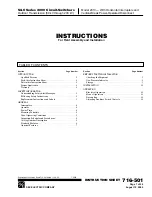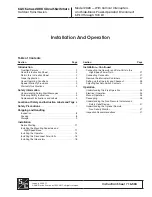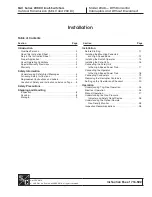
IDT Clocking, Reset and Initialization
PES16T4G2 User Manual
2 - 8
January 28, 2013
Notes
When slot power is enabled by writing a zero to the PCC bit, the Port x Power Enable Output (PxPEP) is
asserted and then power to the slot is enabled and the corresponding downstream port reset output is
negated. The time between the assertion of the PxPEP signal and the negation of the PxRSTN signal is
controlled by the value in the Slot Power to Reset Negation (PWR2RST) field in the HPCFGCTL register.
While slot power is enabled, the corresponding downstream port reset output is negated.
When slot power is disabled by writing a one to the PCC bit, the corresponding downstream port reset
output is asserted and then slot power is disabled. The time between the assertion of the PxRSTN signal
and the negation of the PxPEP signal is controlled by the value in the Reset Negation to Slot Power
(RST2PWR) field in the HPCFGCTL register.
Power Good Controlled Reset Output
As in the Power Enable Controlled Reset mode, in this mode a downstream port reset output state is
controlled as a side effect of slot power being turned on or off. However, the timing in this mode depends on
the power good state of the slot’s power supply. The operation of this mode is illustrated in Figure 2.4.
Figure 2.4 Power Good Controlled Reset Output Mode Operation
The operation of this mode is similar to that of the Power Enable Controlled Reset mode except that
when power is enabled, the negation of the corresponding port reset output occurs as a result of and after
assertion of the slot’s Power Good (PxPWRGDN) signal is observed. The time between the assertion of the
PxPWRGDN signal and the negation of the PxRSTN signal is controlled by the value in the Slot Power to
Reset Negation (PWR2RST) field in the HPCFGCTL register.
When slot power is disabled by writing a one to the PCC bit, the corresponding downstream port reset
output is asserted and then slot power is disabled. The time between the assertion of the PxRSTN signal
and the negation of the PxPEP signal is controlled by the value in the Reset Negation to Slot Power
(RST2PWR) field in the HPCFGCTL register.
If at any point while a downstream port is not being reset (i.e., PxRSTN is negated) a power fault is
detected (i.e., PxPWRGDN is negated), then the corresponding port reset output is immediately asserted.
Since the PxPWRGDN signal is an I/O expander input, it may not be possible to meet a profile’s power level
invalid to reset asserted timing specification (i.e., PxPWRGDN to PxRSTN). Systems that require a shorter
time interval may implement this functionality external to the PES16T4G2.
PxPEP
PxPWRGDN
T
PWR2RST
PxRSTN
T
RST2PWR
Summary of Contents for 89HPES16T4G2
Page 10: ...IDT Table of Contents PES16T4G2 User Manual iv January 28 2013 Notes...
Page 12: ...IDT List of Tables PES16T4G2 User Manual vi January 28 2013 Notes...
Page 14: ...IDT List of Figures PES16T4G2 User Manual viii January 28 2013 Notes...
Page 18: ...IDT Register List PES16T4G2 User Manual xii January 28 2013 Notes...
Page 30: ...IDT PES16T4G2 Device Overview PES16T4G2 User Manual 1 12 January 28 2013 Notes...
Page 48: ...IDT Link Operation PES16T4G2 User Manual 3 10 January 28 2013 Notes...
Page 68: ...IDT SMBus Interfaces PES16T4G2 User Manual 5 18 January 28 2013 Notes...
Page 72: ...IDT Power Management PES16T4G2 User Manual 6 4 January 28 2013 Notes...
Page 140: ...IDT Configuration Registers PES16T4G2 User Manual 8 62 January 28 2013 Notes...
















































